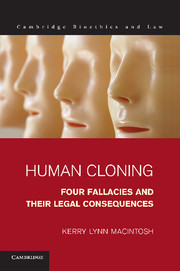Description
Human Cloning
Four Fallacies and their Legal Consequences
Cambridge Bioethics and Law Series
Author: Macintosh Kerry Lynn
Unmasks the role of psychological essentialism in cloning bans, explaining how intuitions cause individuals to act against their own values.
Language: English
Subjects for Human Cloning:
Approximative price 31.58 €
In Print (Delivery period: 14 days).
Add to cart
Human Cloning
Publication date: 03-2014
Support: Print on demand
Publication date: 03-2014
Support: Print on demand
Approximative price 95.69 €
In Print (Delivery period: 14 days).
Add to cart
Human Cloning. Four Fallacies and their Legal Consequences
Publication date: 10-2012
328 p. · 15.2x22.9 cm · Hardback
Publication date: 10-2012
328 p. · 15.2x22.9 cm · Hardback
Description
/li>Contents
/li>Biography
/li>
Since Dolly the sheep was born, controversy has swirled around the technology of cloning. We recoil at the prospect of human copies, manufactured men and women, nefarious impersonators and resurrections of the dead. Such reactions have serious legal consequences: lawmakers have banned stem cell research along with the cloning of babies. But what if our minds have been playing tricks on us? What if everything we thought we knew about human cloning is rooted in intuition rather than fact? Human Cloning: Four Fallacies and their Legal Consequences is a rollicking ride through science, psychology and the law. Drawing on sources ranging from science fiction films to the Congressional Record, this book unmasks the role that psychological essentialism has played in bringing about cloning bans. It explains how hidden intuitions have caused conservatives and liberals to act contrary to their own most cherished ideals and values.
Part I. The Science of Cloning: 1. Animals born through cloning are ordinary members of their species; 2. Animals born through cloning are unique individuals and have their own lifespans; 3. Humans born through cloning will be unique individuals and have their own lifespans; Part II. The Cognitive Psychology of Cloning: 4. Identity and essentialism; 5. Artifacts and essentialism; 6. Imposters and essentialism; 7. Resurrection and essentialism; Part III. The Law of Cloning: 8. Essentialism and the law of reproductive cloning; 9. Essentialism and the law of research cloning.
Kerry Lynn Macintosh is a member of the law and technology faculty at Santa Clara University School of Law. She received her BA from Pomona College and her JD from Stanford Law School, where she was elected to the Order of the Coif. Professor Macintosh is the author of Illegal Beings: Human Clones and the Law (2005). She has published articles in the field of law and technology in the Journal of Law, Technology and Policy; the Harvard Journal of Law and Technology; the Boston University Journal of Science and Technology Law; the Berkeley Technology Law Journal and others. Professor Macintosh is a member of the American Law Institute, a law reform organization.
© 2024 LAVOISIER S.A.S.

